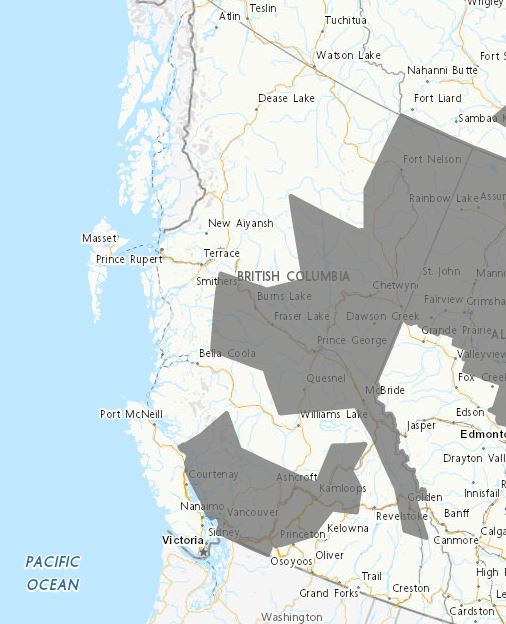An air quality advisory is back in force for the Lower Mainland, amid wildfires that continue to rage in British Columbia’s interior.

In addition, Environment Canada has issued numerous similar advisories for areas including the Sunshine Coast, the Sea-to-Sky region, and a swath of the southern interior including the Fraser Canyon, Nicola, North Thompson and Shuswap.
Another batch of advisories covers the province’s north and northeast, including the Cariboo, Prince George, Bulkley Valley and Peace regions.

“Metro Vancouver Regional District has issued an Air Quality Advisory due to high concentrations of fine particulate matter that are expected to last until there is a change in the weather,” the regional district said in its advisory for Metro Vancouver and the Fraser Valley.
“The fine particulate matter is primarily due to smoke from wildfires burning throughout BC and Washington State.”
As of noon on Friday, Metro Vancouver’s air quality monitoring website reported air quality in the eastern Fraser Valley at a level 7, or “high risk” on the Air Quality Health Index, likely due to smoke coming from the nearby Kookipi Creek wildfire in the Fraser Canyon.

The central Fraser Valley and all of Metro Vancouver except for Richmond and Delta rated at levels 4, 5 or 6, deemed “moderate risk.”
Environment Canada’s bulletin said the smoke was liable to stay in place for at least 24-48 hours. It said smoke in the northeast was coming from fires in the Northwest Territories, while other regions were grappling with smoke from local fires.
Officials are advising people to reduce or postpone outdoor activity while poor air conditions persist, or if they hare having a hard time breathing.
People with underlying health conditions, including asthma, heart or lung diseases, diabetes or respiratory infections are considered at higher risk.

Risk is also elevated for pregnant people, infants and children, seniors, outdoor workers, and socially marginalized people such as the homeless.
Environment Canada advises that people seek out cool places with filtered air, including community centres or malls, or install portable HEPA filters or air conditions in their home.
Anyone experiencing symptoms such as chest discomfort, shortness of breath, coughing or wheezing should seek medical attention, or call 911 in the case of an emergency.
- AI to play key role in U.S. adversaries’ efforts to influence elections: officials
- Not just Canada: A look at extreme weather events all over the world
- ‘High risk’: Canada, allies warn of state-sponsored cyberthreats to civil society
- Google adds AI-crafted summaries to search. Could that impact web traffic?





Comments